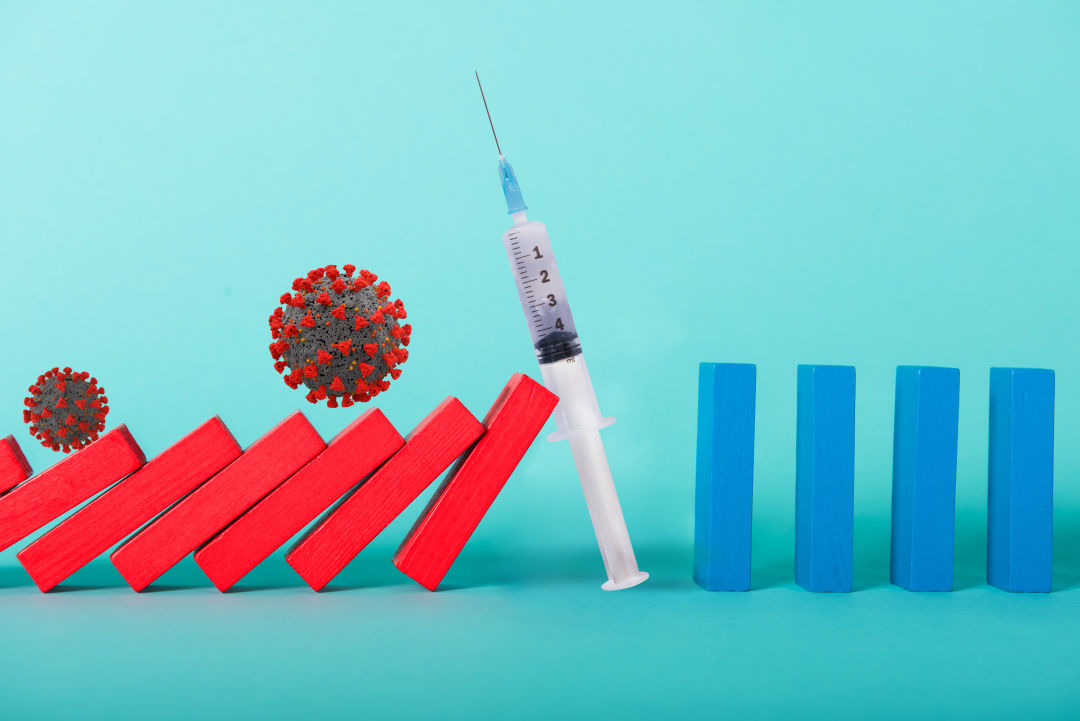Does Natural Immunity Have a Role to Play in Oregon's Reopening Goal?

The dominoes haven't all fallen yet to open Oregon back up.
Image: alphaspirit.it/Shutterstock
Oregon is inching oh-so-slowly closer to Gov. Kate Brown’s targeted 70 percent of the state’s eligible adults having received at least one dose of a COVID-19 vaccine before almost all masking and capacity restrictions are lifted statewide, with just a hair over 65,000 people to go.
But new candidates for vaccinations have slowed to a trickle, despite the state’s increasingly thirsty incentives: $100 gift cards! A chance to win a million bucks! Free tacos! (Now we’re talking.)
Meanwhile, almost every other state in the country, save for New Mexico, Washington, Michigan, and Hawaii, have dropped their COVID-19 restrictions, either because they’ve hit the 70 percent target or because they were less cautious about lockdowns (and have higher case levels and deaths) than Oregon has been all along. (New York and California both joined the first category this week; in the second category, think Florida, Texas—essentially all of the south and the right-leaning Mountain West.)
Oregon’s slow pace—5,510 doses were administered on June 14, for example— combined with a tiny plateau in the number of new COVID-19 cases diagnosed each week (still down significantly from a peak in late April, and hospitalizations and deaths are way down too), has some restless residents wondering why those who have natural immunity from COVID-19—those who have had the disease and recovered—can’t be counted toward that 70 percent goal, which we’re on track to reach by late June. (The state is not tracking how many people who have recovered from COVID-19 have gotten vaccinated.)
After all, just over 200,000 Oregonians have had confirmed cases of COVID-19, and the real number could be significantly higher. The Institute for Health Metrics and Evaluation has estimated that actually, about 17 percent of Oregonians have had COVID, or about 714,000 people.
But it’s unclear whether people who’ve had an extremely mild or asymptomatic case of COVID would have developed enough protective antibodies to have true natural immunity; in its most recent status update, the state’s estimate is that about 8.5 percent of all Oregonians have true natural immunity, about 1/4th the total of those who have immunity via vaccination.
Researchers generally agree that having recovered from COVID provides you with some level of immunity, though for how long, and at what strength, is in dispute. Writing in Nature this week, two German researchers say that evidence suggests that immunity post infection remains strong for six months to a year.
Just published @Nature
— Eric Topol (@EricTopol) June 14, 2021
Prior covid induces long-lasting humoral immunity for at least 1 year. Adding an mRNA vaccine provides markedly increased neutralizing antibody and memory B cells against the variantshttps://t.co/EOyXFhsHEe@NussenzweigL @RockefellerUniv pic.twitter.com/TmhMX9V5Yl
In our own backyard, Dr. Bill Messer, an assistant professor of molecular microbiology and immunology at the OHSU School of Medicine, last week contributed to a yet-to-be-peer-reviewed study suggesting that previously infected people are showing signs of immunity to variants for as long as 11 months post infection. The World Health Organization has been slightly less bullish, but they estimate that within a month of having had COVID, 90-99 percent of people develop “neutralizing antibodies” that protects against re-infection for between six and eight months.
Given this, some researchers have recommended that the rest of the world follow France’s lead, and give only one dose of the Pfeizer, AstraZeneca, or Moderna vaccine to those who have recovered from COVID-19; research suggests that natural immunity and the vaccines are a super-powerful combination, and could even eliminate the need for booster shots for that population.
But moving toward a single shot for the previously infected is not in the cards for Oregon, and neither is counting those who are naturally immune toward the 70 percent goal, says Rudy Owens, a spokesman for the Oregon Health Authority.
“With highly effective and safe vaccines available, even those who have had previous infection can benefit from the additional protection conferred by vaccination,” Owens wrote in an email. “Getting COVID-19 offers some natural protection, known as immunity, and research shows reinfection with the virus that causes COVID-19 is uncommon in the 90 days after initial infection. We don’t know how long that protection lasts.”
At OHSU, Messer has also noted that you'll be best protected against the virus and its variants via getting vaccinated, regardless of whether you've previously had COVID.
In addition, Owens says, it's vaccine-derived immunity—not natural immunity— that gets the credit for driving down transmission rates statewide, leading to fewer deaths and hospitalizations. That’s underpinning the urgency and laser-focus of the vaccination campaign in Oregon, a message already muddled enough by insidious amount of misinformation.
“The vaccines have undergone some of the most rigorous safety monitoring in U.S. history and remain our best means to bring the pandemic under control and return to the lives we enjoyed before,” Owens says.




